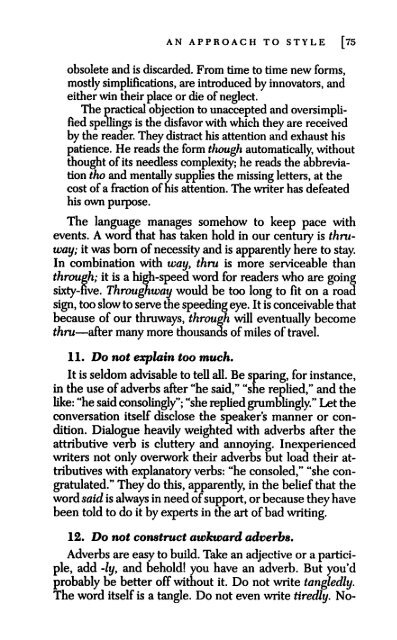You also want an ePaper? Increase the reach of your titles
YUMPU automatically turns print PDFs into web optimized ePapers that Google loves.
A N A P P R O A C H T O S T Y L E [ 7 5<br />
obsolete and is discarded. From time to time new forms,<br />
mostly simplifications, are introduced by innovators, and<br />
either win their place or die of neglect.<br />
<strong>The</strong> practical objection to unaccepted and oversimpli<br />
fied spellings is the disfavor with which they are received<br />
by the reader. <strong>The</strong>y distract his attention and exhaust his<br />
patience. He reads the form though automatically, without<br />
thought of its needless complexity; he reads the abbrevia<br />
tion tho and mentally supplies the missing letters, at the<br />
cost of a fraction of his attention. <strong>The</strong> writer has defeated<br />
his own purpose.<br />
<strong>The</strong> language manages somehow to keep pace with<br />
events. A word that has taken hold in our century is thruway;<br />
it was bom of necessity and is apparendy here to stay.<br />
In combination with way, thru is more serviceable than<br />
through; it is a high-speed word for readers who are going<br />
sixty-five. Throughway would be too long to fit on a road<br />
sign, too slow to serve die speeding eye. It is conceivable that<br />
because of our thruways, through will eventually become<br />
thru—after many more thousands of miles of travel.<br />
11. Do not explain too much.<br />
It is seldom advisable to tell all. Be sparing, for instance,<br />
in the use of adverbs after "he said," "she replied," and the<br />
like: "he said consolingly"; "she replied grumblingly." Let the<br />
conversation itself disclose the speaker's manner or con<br />
dition. Dialogue heavily weighted with adverbs after the<br />
attributive verb is cluttery and annoying. Inexperienced<br />
writers not only overwork their adverbs but load their at<br />
tributives with explanatory verbs: "he consoled," "she con<br />
gratulated." <strong>The</strong>y do this, apparendy, in the belief that the<br />
word said is always in need of support, or because they have<br />
been told to do it by experts in the art of bad writing.<br />
12. Do not construct awkward adverbs.<br />
Adverbs are easy to build. Take an adjective or a partici<br />
ple, add -ly, and behold! you have an adverb. But you'd<br />
probably be better off without it. Do not write tangledly.<br />
<strong>The</strong> word itself is a tangle. Do not even write tiredly. No-


